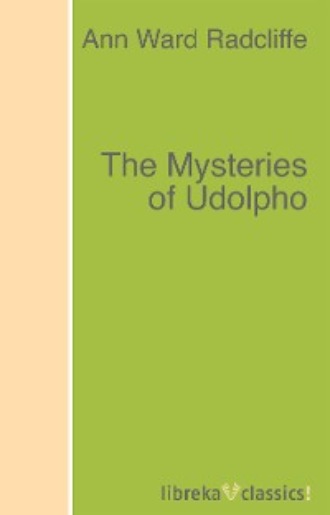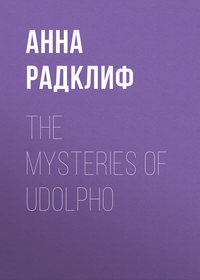
Полная версия
The Mysteries of Udolpho

Titel: The Mysteries of Udolpho
von Augustus J. Thebaud, Charles Kingsley, Henry James, Thomas Hardy, Kate Douglas Smith Wiggin, Joseph Butler, John D. Barry, William Allan Neilson, Henry Rider Haggard, Rudolf Erich Raspe, Paul Heyse, Carl Russell Fish, Tom Taylor, Margaret Pedler, Homer, John Kendrick Bangs, John Burroughs, Juanita Helm Floyd, Maurice Liber, Anthony Trollope, William Morris, Mark Twain, Charles Dudley Warner, Thomas Hobbes, Winfried Honig, Albrecht Dürer, Militia of Mercy . Gift Book Committee, Ella Wheeler Wilcox, Andrew Lang, Katharine Pyle, Sir Samuel White Baker, Frederic William Moorman, the Younger Pliny, Samuel Butler, William Dean Howells, Harold MacGrath, Joseph Crosby Lincoln, Ralph Connor, Various, Oliver Wendell Holmes, Abraham Lincoln, John Galsworthy, Ian Maclaren, Charlotte Mary Yonge, Sir Owen Morgan Edwards, Robert J. C. Stead, Harold Bell Wright, Eleanor H. Porter, Richard Le Gallienne, Ann Ward Radcliffe
ISBN 978-3-7429-3153-5
Alle Rechte vorbehalten.
Es ist ohne vorherige schriftliche Erlaubnis nicht gestattet, dieses Werk im Ganzen oder in Teilen zu vervielfältigen oder zu veröffentlichen.
THE MYSTERIES OF UDOLPHO
A Romance
Interspersed With Some Pieces of Poetry
By Ann Radcliffe
Contents
VOLUME 1 CHAPTER I CHAPTER II CHAPTER III CHAPTER IV CHAPTER V CHAPTER VI CHAPTER VII CHAPTER VIII CHAPTER IX CHAPTER X CHAPTER XI CHAPTER XII CHAPTER XIII VOLUME 2 CHAPTER I CHAPTER II CHAPTER III CHAPTER IV CHAPTER V CHAPTER VI CHAPTER VII CHAPTER VIII CHAPTER IX CHAPTER X CHAPTER XI CHAPTER XII VOLUME 3 CHAPTER I CHAPTER II CHAPTER III CHAPTER IV CHAPTER V CHAPTER VI CHAPTER VII CHAPTER VIII CHAPTER IV CHAPTER X CHAPTER XI CHAPTER XII CHAPTER XIII VOLUME 4 CHAPTER I CHAPTER II CHAPTER III CHAPTER IV CHAPTER V CHAPTER VI CHAPTER VII CHAPTER VIII CHAPTER IV CHAPTER X CHAPTER XI CHAPTER XII CHAPTER XIII CHAPTER XIV CHAPTER XV CHAPTER XVI CHAPTER XVII CHAPTER XVIII CHAPTER XIX
VOLUME 1
CHAPTER I
On the pleasant banks of the Garonne, in the province of Gascony, stood, in the year 1584, the chateau of Monsieur St. Aubert. From its windows were seen the pastoral landscapes of Guienne and Gascony stretching along the river, gay with luxuriant woods and vine, and plantations of olives. To the south, the view was bounded by the majestic Pyrenees, whose summits, veiled in clouds, or exhibiting awful forms, seen, and lost again, as the partial vapours rolled along, were sometimes barren, and gleamed through the blue tinge of air, and sometimes frowned with forests of gloomy pine, that swept downward to their base. These tremendous precipices were contrasted by the soft green of the pastures and woods that hung upon their skirts; among whose flocks, and herds, and simple cottages, the eye, after having scaled the cliffs above, delighted to repose. To the north, and to the east, the plains of Guienne and Languedoc were lost in the mist of distance; on the west, Gascony was bounded by the waters of Biscay.
M. St. Aubert loved to wander, with his wife and daughter, on the margin of the Garonne, and to listen to the music that floated on its waves. He had known life in other forms than those of pastoral simplicity, having mingled in the gay and in the busy scenes of the world; but the flattering portrait of mankind, which his heart had delineated in early youth, his experience had too sorrowfully corrected. Yet, amidst the changing visions of life, his principles remained unshaken, his benevolence unchilled; and he retired from the multitude 'more in PITY than in anger,' to scenes of simple nature, to the pure delights of literature, and to the exercise of domestic virtues.
He was a descendant from the younger branch of an illustrious family, and it was designed, that the deficiency of his patrimonial wealth should be supplied either by a splendid alliance in marriage, or by success in the intrigues of public affairs. But St. Aubert had too nice a sense of honour to fulfil the latter hope, and too small a portion of ambition to sacrifice what he called happiness, to the attainment of wealth. After the death of his father he married a very amiable woman, his equal in birth, and not his superior in fortune. The late Monsieur St. Aubert's liberality, or extravagance, had so much involved his affairs, that his son found it necessary to dispose of a part of the family domain, and, some years after his marriage, he sold it to Monsieur Quesnel, the brother of his wife, and retired to a small estate in Gascony, where conjugal felicity, and parental duties, divided his attention with the treasures of knowledge and the illuminations of genius.
To this spot he had been attached from his infancy. He had often made excursions to it when a boy, and the impressions of delight given to his mind by the homely kindness of the grey-headed peasant, to whom it was intrusted, and whose fruit and cream never failed, had not been obliterated by succeeding circumstances. The green pastures along which he had so often bounded in the exultation of health, and youthful freedom—the woods, under whose refreshing shade he had first indulged that pensive melancholy, which afterwards made a strong feature of his character—the wild walks of the mountains, the river, on whose waves he had floated, and the distant plains, which seemed boundless as his early hopes—were never after remembered by St. Aubert but with enthusiasm and regret. At length he disengaged himself from the world, and retired hither, to realize the wishes of many years.
The building, as it then stood, was merely a summer cottage, rendered interesting to a stranger by its neat simplicity, or the beauty of the surrounding scene; and considerable additions were necessary to make it a comfortable family residence. St. Aubert felt a kind of affection for every part of the fabric, which he remembered in his youth, and would not suffer a stone of it to be removed, so that the new building, adapted to the style of the old one, formed with it only a simple and elegant residence. The taste of Madame St. Aubert was conspicuous in its internal finishing, where the same chaste simplicity was observable in the furniture, and in the few ornaments of the apartments, that characterized the manners of its inhabitants.
The library occupied the west side of the chateau, and was enriched by a collection of the best books in the ancient and modern languages. This room opened upon a grove, which stood on the brow of a gentle declivity, that fell towards the river, and the tall trees gave it a melancholy and pleasing shade; while from the windows the eye caught, beneath the spreading branches, the gay and luxuriant landscape stretching to the west, and overlooked on the left by the bold precipices of the Pyrenees. Adjoining the library was a green-house, stored with scarce and beautiful plants; for one of the amusements of St. Aubert was the study of botany, and among the neighbouring mountains, which afforded a luxurious feast to the mind of the naturalist, he often passed the day in the pursuit of his favourite science. He was sometimes accompanied in these little excursions by Madame St. Aubert, and frequently by his daughter; when, with a small osier basket to receive plants, and another filled with cold refreshments, such as the cabin of the shepherd did not afford, they wandered away among the most romantic and magnificent scenes, nor suffered the charms of Nature's lowly children to abstract them from the observance of her stupendous works. When weary of sauntering among cliffs that seemed scarcely accessible but to the steps of the enthusiast, and where no track appeared on the vegetation, but what the foot of the izard had left; they would seek one of those green recesses, which so beautifully adorn the bosom of these mountains, where, under the shade of the lofty larch, or cedar, they enjoyed their simple repast, made sweeter by the waters of the cool stream, that crept along the turf, and by the breath of wild flowers and aromatic plants, that fringed the rocks, and inlaid the grass.
Adjoining the eastern side of the green-house, looking towards the plains of Languedoc, was a room, which Emily called hers, and which contained her books, her drawings, her musical instruments, with some favourite birds and plants. Here she usually exercised herself in elegant arts, cultivated only because they were congenial to her taste, and in which native genius, assisted by the instructions of Monsieur and Madame St. Aubert, made her an early proficient. The windows of this room were particularly pleasant; they descended to the floor, and, opening upon the little lawn that surrounded the house, the eye was led between groves of almond, palm-trees, flowering-ash, and myrtle, to the distant landscape, where the Garonne wandered.
The peasants of this gay climate were often seen on an evening, when the day's labour was done, dancing in groups on the margin of the river. Their sprightly melodies, debonnaire steps, the fanciful figure of their dances, with the tasteful and capricious manner in which the girls adjusted their simple dress, gave a character to the scene entirely French.
The front of the chateau, which, having a southern aspect, opened upon the grandeur of the mountains, was occupied on the ground floor by a rustic hall, and two excellent sitting rooms. The first floor, for the cottage had no second story, was laid out in bed-chambers, except one apartment that opened to a balcony, and which was generally used for a breakfast-room.
In the surrounding ground, St. Aubert had made very tasteful improvements; yet, such was his attachment to objects he had remembered from his boyish days, that he had in some instances sacrificed taste to sentiment. There were two old larches that shaded the building, and interrupted the prospect; St. Aubert had sometimes declared that he believed he should have been weak enough to have wept at their fall. In addition to these larches he planted a little grove of beech, pine, and mountain-ash. On a lofty terrace, formed by the swelling bank of the river, rose a plantation of orange, lemon, and palm-trees, whose fruit, in the coolness of evening, breathed delicious fragrance. With these were mingled a few trees of other species. Here, under the ample shade of a plane-tree, that spread its majestic canopy towards the river, St. Aubert loved to sit in the fine evenings of summer, with his wife and children, watching, beneath its foliage, the setting sun, the mild splendour of its light fading from the distant landscape, till the shadows of twilight melted its various features into one tint of sober grey. Here, too, he loved to read, and to converse with Madame St. Aubert; or to play with his children, resigning himself to the influence of those sweet affections, which are ever attendant on simplicity and nature. He has often said, while tears of pleasure trembled in his eyes, that these were moments infinitely more delightful than any passed amid the brilliant and tumultuous scenes that are courted by the world. His heart was occupied; it had, what can be so rarely said, no wish for a happiness beyond what it experienced. The consciousness of acting right diffused a serenity over his manners, which nothing else could impart to a man of moral perceptions like his, and which refined his sense of every surrounding blessing.
The deepest shade of twilight did not send him from his favourite plane-tree. He loved the soothing hour, when the last tints of light die away; when the stars, one by one, tremble through aether, and are reflected on the dark mirror of the waters; that hour, which, of all others, inspires the mind with pensive tenderness, and often elevates it to sublime contemplation. When the moon shed her soft rays among the foliage, he still lingered, and his pastoral supper of cream and fruits was often spread beneath it. Then, on the stillness of night, came the song of the nightingale, breathing sweetness, and awakening melancholy.
The first interruptions to the happiness he had known since his retirement, were occasioned by the death of his two sons. He lost them at that age when infantine simplicity is so fascinating; and though, in consideration of Madame St. Aubert's distress, he restrained the expression of his own, and endeavoured to bear it, as he meant, with philosophy, he had, in truth, no philosophy that could render him calm to such losses. One daughter was now his only surviving child; and, while he watched the unfolding of her infant character, with anxious fondness, he endeavoured, with unremitting effort, to counteract those traits in her disposition, which might hereafter lead her from happiness. She had discovered in her early years uncommon delicacy of mind, warm affections, and ready benevolence; but with these was observable a degree of susceptibility too exquisite to admit of lasting peace. As she advanced in youth, this sensibility gave a pensive tone to her spirits, and a softness to her manner, which added grace to beauty, and rendered her a very interesting object to persons of a congenial disposition. But St. Aubert had too much good sense to prefer a charm to a virtue; and had penetration enough to see, that this charm was too dangerous to its possessor to be allowed the character of a blessing. He endeavoured, therefore, to strengthen her mind; to enure her to habits of self-command; to teach her to reject the first impulse of her feelings, and to look, with cool examination, upon the disappointments he sometimes threw in her way. While he instructed her to resist first impressions, and to acquire that steady dignity of mind, that can alone counterbalance the passions, and bear us, as far as is compatible with our nature, above the reach of circumstances, he taught himself a lesson of fortitude; for he was often obliged to witness, with seeming indifference, the tears and struggles which his caution occasioned her.
In person, Emily resembled her mother; having the same elegant symmetry of form, the same delicacy of features, and the same blue eyes, full of tender sweetness. But, lovely as was her person, it was the varied expression of her countenance, as conversation awakened the nicer emotions of her mind, that threw such a captivating grace around her:
St. Aubert cultivated her understanding with the most scrupulous care. He gave her a general view of the sciences, and an exact acquaintance with every part of elegant literature. He taught her Latin and English, chiefly that she might understand the sublimity of their best poets. She discovered in her early years a taste for works of genius; and it was St. Aubert's principle, as well as his inclination, to promote every innocent means of happiness. 'A well-informed mind,' he would say, 'is the best security against the contagion of folly and of vice. The vacant mind is ever on the watch for relief, and ready to plunge into error, to escape from the languor of idleness. Store it with ideas, teach it the pleasure of thinking; and the temptations of the world without, will be counteracted by the gratifications derived from the world within. Thought, and cultivation, are necessary equally to the happiness of a country and a city life; in the first they prevent the uneasy sensations of indolence, and afford a sublime pleasure in the taste they create for the beautiful, and the grand; in the latter, they make dissipation less an object of necessity, and consequently of interest.'
It was one of Emily's earliest pleasures to ramble among the scenes of nature; nor was it in the soft and glowing landscape that she most delighted; she loved more the wild wood-walks, that skirted the mountain; and still more the mountain's stupendous recesses, where the silence and grandeur of solitude impressed a sacred awe upon her heart, and lifted her thoughts to the GOD OF HEAVEN AND EARTH. In scenes like these she would often linger along, wrapt in a melancholy charm, till the last gleam of day faded from the west; till the lonely sound of a sheep-bell, or the distant bark of a watch-dog, were all that broke on the stillness of the evening. Then, the gloom of the woods; the trembling of their leaves, at intervals, in the breeze; the bat, flitting on the twilight; the cottage-lights, now seen, and now lost—were circumstances that awakened her mind into effort, and led to enthusiasm and poetry.
Her favourite walk was to a little fishing-house, belonging to St. Aubert, in a woody glen, on the margin of a rivulet that descended from the Pyrenees, and, after foaming among their rocks, wound its silent way beneath the shades it reflected. Above the woods, that screened this glen, rose the lofty summits of the Pyrenees, which often burst boldly on the eye through the glades below. Sometimes the shattered face of a rock only was seen, crowned with wild shrubs; or a shepherd's cabin seated on a cliff, overshadowed by dark cypress, or waving ash. Emerging from the deep recesses of the woods, the glade opened to the distant landscape, where the rich pastures and vine-covered slopes of Gascony gradually declined to the plains; and there, on the winding shores of the Garonne, groves, and hamlets, and villas—their outlines softened by distance, melted from the eye into one rich harmonious tint.
This, too, was the favourite retreat of St. Aubert, to which he frequently withdrew from the fervour of noon, with his wife, his daughter, and his books; or came at the sweet evening hour to welcome the silent dusk, or to listen for the music of the nightingale. Sometimes, too, he brought music of his own, and awakened every fairy echo with the tender accents of his oboe; and often have the tones of Emily's voice drawn sweetness from the waves, over which they trembled.
It was in one of these excursions to this spot, that she observed the following lines written with a pencil on a part of the wainscot:
These lines were not inscribed to any person; Emily therefore could not apply them to herself, though she was undoubtedly the nymph of these shades. Having glanced round the little circle of her acquaintance without being detained by a suspicion as to whom they could be addressed, she was compelled to rest in uncertainty; an uncertainty which would have been more painful to an idle mind than it was to hers. She had no leisure to suffer this circumstance, trifling at first, to swell into importance by frequent remembrance. The little vanity it had excited (for the incertitude which forbade her to presume upon having inspired the sonnet, forbade her also to disbelieve it) passed away, and the incident was dismissed from her thoughts amid her books, her studies, and the exercise of social charities.
Soon after this period, her anxiety was awakened by the indisposition of her father, who was attacked with a fever; which, though not thought to be of a dangerous kind, gave a severe shock to his constitution. Madame St. Aubert and Emily attended him with unremitting care; but his recovery was very slow, and, as he advanced towards health, Madame seemed to decline.
The first scene he visited, after he was well enough to take the air, was his favourite fishing-house. A basket of provisions was sent thither, with books, and Emily's lute; for fishing-tackle he had no use, for he never could find amusement in torturing or destroying.
After employing himself, for about an hour, in botanizing, dinner was served. It was a repast, to which gratitude, for being again permitted to visit this spot, gave sweetness; and family happiness once more smiled beneath these shades. Monsieur St. Aubert conversed with unusual cheerfulness; every object delighted his senses. The refreshing pleasure from the first view of nature, after the pain of illness, and the confinement of a sick-chamber, is above the conceptions, as well as the descriptions, of those in health. The green woods and pastures; the flowery turf; the blue concave of the heavens; the balmy air; the murmur of the limpid stream; and even the hum of every little insect of the shade, seem to revivify the soul, and make mere existence bliss.
Madame St. Aubert, reanimated by the cheerfulness and recovery of her husband, was no longer sensible of the indisposition which had lately oppressed her; and, as she sauntered along the wood-walks of this romantic glen, and conversed with him, and with her daughter, she often looked at them alternately with a degree of tenderness, that filled her eyes with tears. St. Aubert observed this more than once, and gently reproved her for the emotion; but she could only smile, clasp his hand, and that of Emily, and weep the more. He felt the tender enthusiasm stealing upon himself in a degree that became almost painful; his features assumed a serious air, and he could not forbear secretly sighing—'Perhaps I shall some time look back to these moments, as to the summit of my happiness, with hopeless regret. But let me not misuse them by useless anticipation; let me hope I shall not live to mourn the loss of those who are dearer to me than life.'
To relieve, or perhaps to indulge, the pensive temper of his mind, he bade Emily fetch the lute she knew how to touch with such sweet pathos. As she drew near the fishing-house, she was surprised to hear the tones of the instrument, which were awakened by the hand of taste, and uttered a plaintive air, whose exquisite melody engaged all her attention. She listened in profound silence, afraid to move from the spot, lest the sound of her steps should occasion her to lose a note of the music, or should disturb the musician. Every thing without the building was still, and no person appeared. She continued to listen, till timidity succeeded to surprise and delight; a timidity, increased by a remembrance of the pencilled lines she had formerly seen, and she hesitated whether to proceed, or to return.









